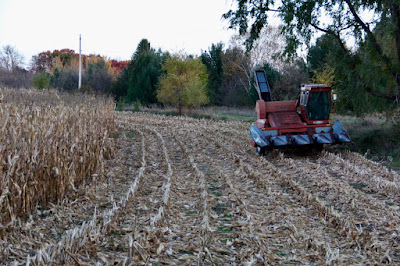The township is brushing out the roadside ditches on our road. It will be interesting to see what our property edge looks like after they're done. When we walked the dog at midday, we noticed the crew had somehow collected more brush and branches than we believed were on, in, or over the roadway easement. Township roadways can be a source of friction at the public / private interface of country living.
The Better Half noted this morning, as we headed toward the bank, that all of the trees and fields were recoated with frozen fog. On her trips yesterday, the coating had all melted. We've managed to keep our screams to a minimum, but the combination of clouds, fog, and ice crystals covering almost everything in sight has passed the point of "seeming" bleak. On the brighter side, three of the four amaryllis plants now have open blossoms. By week's end, we will be halfway through meteorological Winter. (Can you sense we're grasping at straws here?)
 |
| amaryllis against the fog
Photo by J. Harrington
|
After we left the bank, we headed for our local book store. They didn't have a copy of Tom Philpott's Perilous Bounty, The Looming Collapse of American Farming and How We Can Prevent It, so we asked them to order in a copy for us. We've been eyeing it off and on since it was first published, and decided we needed to read the whole thing after reading an interview with Philpott in CivilEats. A farm support organization of which we have long been a member, Land Stewardship Project [LSP], is proposing legislation to pay farmers for the provision of ecosystem services in the form of soil healthy farming. We're perpetually aggravated by the way industrial agriculture abuses the soil, air, water and its neighbors, and the way consolidation in the bigag seed, pesticides and related sectors have many farmers forced to consolidate or get out. We support the goals that LSP wants to attain. We've become cynical as we can get that there might be a real relationship between benefits and payments. We also admit that we spent most of our working life in a model based on the polluter pays principle, so we're biased that way.
 |
| local farm at harvest time
Photo by J. Harrington
|
On the other hand, as economists like to say, we probably don't know enough about what conditions, if any, make paying for the provision of ecosystem services instead of applying the polluter pays principle appropriate. So we'll do some more reading and throw in some rereading of Leopold's Sand County Almanac and add reading on management of the commons, another topic on which we wish we had read more in our younger days.
The Farmer
By W.D. EhrhartEach day I go into the fieldsto see what is growingand what remains to be done.It is always the same thing: nothingis growing, everything needs to be done.Plow, harrow, disc, water, praytill my bones ache and hands rubblood-raw with honest labor—all that grows is the slowintransigent intensity of need.I have sown my seed on soilguaranteed by poverty to fail.But I don’t complain—exceptto passersby who ask me whyI work such barren earth.They would not understand meif I stooped to lift a rockand hold it like a child, or laughed,or told them it is their povertyI labor to relieve. For them,I complain. A farmer of dreamsknows how to pretend. A farmer of dreamsknows what it means to be patient.Each day I go into the fields.
********************************************
Thanks for visiting. Come again when you can.
Please be kind to each other while you can.
No comments:
Post a Comment